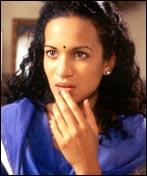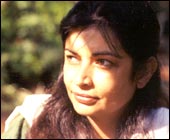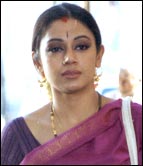 | « Back to article | Print this article |
The slim, short-haired woman calling the shots knows exactly what she wants. Before every scene, she describes what is to be filmed in detail to her actors. She also tells them exactly what it will look like on film. 
The English film Dance Like A Man, based on Mahesh Dattani's play of the same name, will be exactly how director Pamela Rooks intends it to be.
Rediff.com followed Rooks around the southern city of Bangalore, from the indoor sets of the Jayamahal Palace Hotel to outdoor scenes at the Lalbagh Gardens and Paradise Island restaurant.
Rooks is working hard to finish a film in a tight three-week schedule. M D Riti meets Rooks as she munches her way through working lunches on location:
What made you choose this play to make a movie on?
Because it is full of humour and pathos. It is so completely reflective of modern Indian realism, yet has such universal appeal.
But it is written in a style obviously suited only for the stage.
It is an intimate story and will be treated with the cinematic values it deserves. Sometimes, movies based on plays do appear stagey, but that is because the director has yet to master the cinematic language, or has deliberately decided to treat the subject thus. I view the stage and cinema as totally different mediums.
The play is set inside the home of the main protagonists. Have you adapted the story and moved it outdoors?
The home is essential to the movie. We have also shot outside. The play has five characters. I have brought in new cameos and other characters. I have also used a lot of movement in my shots to make the film lively. The y are not static shots. It all depends on how you photograph something.
y are not static shots. It all depends on how you photograph something.
How did you cast your film?
Shobhana was an obvious choice. She is an excellent actress and a great Bharata Natyam dancer. It is a miracle I found someone like her. I have known Anoushka [Shankar, who plays Shobhana's daughter] for years. I know her through her father Pandit Ravi Shankar, who composed music for my ex-husband's film (Conrad Rooks, Siddhartha). Anoushka has a certain vivacity that translates well on screen. She has also done 12 years of Bharata Natyam.
I saw Arif [Zakaria] in an amazing role as a eunuch's son in the Hindi film Darmiyan. There was an intensity and dedication about him that I felt would suit the role of Jairaj well. He had no dance experience. But he did intensive training in Bharata Natyam for the last five months. Shobhana was amazed that he comes across as a dancer.
Why have you not involved Mahesh Dattani in the filming though he lives in Bangalore?
Mahesh is the writer of the story, the play, even the screenplay of this film. I think he trusts me to do the right thing. He has visited the sets a few times. I think he is quite comfortable with the way I am handling the film.
He will watch the film when it is over
Why are you shooting the film in Bangalore?
Because the original play is set here. It's a wonderful city. People have been very kind and helpful.
The only problem I have faced are the stringent union rules here. Filmmakers with small budgets might find it hard to make films in Bangalore if they have to comply with these rules. It simply becomes too expensive. If you go one hour beyond a call, they charge you for a whole call sheet. People are not allowed to work on second Sundays even if they want to.
Then ag ain, they charge more for English and Hindi films. These are also Indian languages, aren't they? They cannot be so rigid.
ain, they charge more for English and Hindi films. These are also Indian languages, aren't they? They cannot be so rigid.
Do you think the film will make money at the Indian box-office?
As far as I am concerned, I know this product can make money. That depends whether it is marketed well. You can have a good product, but it could be lost without the right marketing. In the past, I simply gave my films to the National Films Development Corporation. This time, I am taking a strong stand.
Are you working with a low budget or a big one?
We started with a very small budget with NFDC. We now have some corporate houses to help us out. Any additional money will be put aside for marketing. These are things we will explore when we have finished shooting.
Train To Pakistan was a Hindi film. Why is this one in English?
That film was in Hindi because I could not see a villager speaking English! This one is set in a milieu where people speak English. I have not made their accents different or Anglicised. They use their own accents, ranging from South Indian in the case of Shobhana, a little more upmarket and educated for Arif. Anoushka's accent, which is normally very American, has been toned down. Now she and Samir speak just like the young kids do in Bangalore.